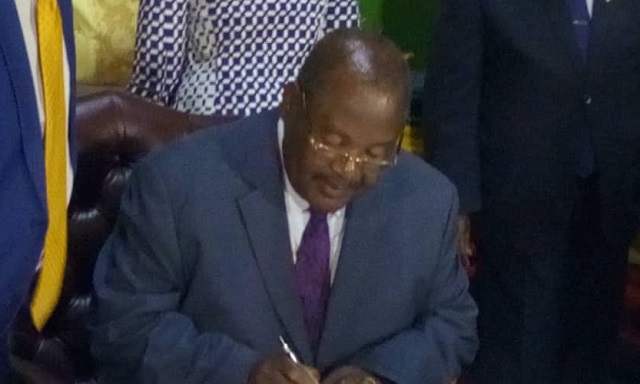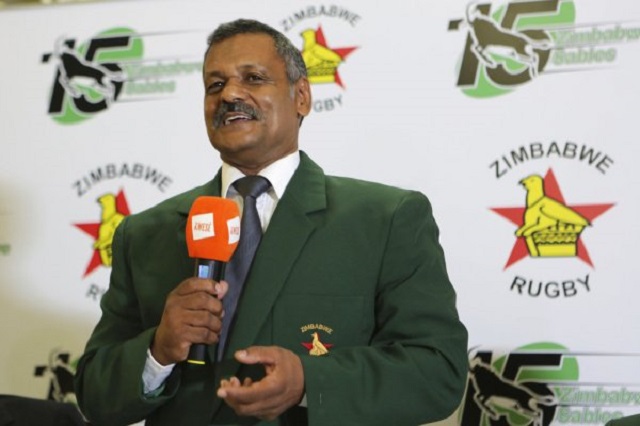The peace pledge has set the tone

Justice Simango
Over the past few months, political talk has become extremely heated. Once upon a time, polite people weren’t supposed to discuss in social settings (politics and religion), but today, that seems a tad too strict.
In fact, discussing politics has become enlightening and healthy in many relationships. Unfortunately, the respect factor is often a sticking point, especially now when Zimbabweans are going to the polls 30 days from today.
It was the late Vice President Dr John Nkomo who said: “Peace begins with you, peace begins with me and peace begins with all of us.” Just this past week, all 23 presidential aspirants in the July 30 national harmonised elections signed a high level peace pledge committing themselves and their political parties to a peaceful campaign ahead of the polls.
A lot of political talk is going on between and among the young and the old and once the political discussion begin, people who start out with the best of intentions often become defensive and then offensive.
The electorate is anxious of the election outcome. Some are taking advantage of the season and sharing their political analysis with colleagues and friends.
The respective candidates and their campaign teams are working flat out to reach out to the electorate even those outside the reach of mainstream services, but whatever strategy candidates use, the high level peace pledge has set the tone for all political conversations.
Well, such talks are expected during election period anyway, no wonder why the National Peace and Reconciliation Commission organised the signing ceremony but if you are a fan of politics then it’s safe to be cautious about where you discuss politics. If you’re not careful, a heated political discussion at the office can ruin your reputation at the office and hurt your prospects of moving up the corporate ladder.
Getting into a debate with friends could damage even a long-term relationship, and when you demand to have your say at the dinner table during a family meal you might cause indigestion in those who love you the most.
One thing we all need to remember is that tirades, rants, and name-calling will never win over someone who disagrees with you. It might make you feel better momentarily, but after a while, you may regret some of the things you said in the heat of the moment. Even if you don’t, friends who have been subjected to your outbursts may walk a wide berth around you in the future.
You may not care, and if that’s the case, this isn’t for you. However, if you are concerned even a tiny bit, here are some suggestions on how you can preserve peace and show respect for others as you talk about your political beliefs:
1. Know what you and others can handle. If you are someone who loves a heavy-duty political debate, go right ahead and have at it. On the other hand, if you are easily offended and get your hackles up when someone attacks your political views, don’t let the conversation go in that direction. There is no point in damaging an otherwise healthy relationship for the sake of a political conversation that will leave you feeling hurt or angry.
2. Listen. Give everyone a chance to speak before you break into a long discussion. Speaking from experience, I know it’s difficult not to interrupt when you agree or disagree strongly with something that is said, but at least give it a try.
3. Avoid an accusatory tone. If a debate ensues, try to keep your tone even and without any hint of accusing someone of being anything negative (stupid, unenlightened, immoral, or anything that can start a heated argument).
4. Avoid name-calling. The second someone calls another person in the group a derogatory name, the discussion is on dangerous ground. Don’t be that person.
5. Ask questions. If you aren’t clear on a point that someone is making — whether you agree or disagree — ask specific questions to clarify. And then give the person a chance to answer without interruption. You may be surprised and learn something when she answers.
6. Don’t take anything personal. Someone may totally oppose your political beliefs, but if she is your friend, it’s obvious that she likes you as a person. Don’t consider yourself personally affronted just because someone disagrees with your presidential candidate.
7. Don’t sling arrows or use foul language. If you know you’re in the presence of someone who has opposing views, don’t take jabs at people who believe what she does and desist from swearing. That will only drive a wedge between you, and you may never be able to repair the relationship in the future. Polite language will keep others listening and engaged in the conversation.
8. Do research. Before you state something as fact, research the details. Your argument won’t stand up if you misquote or misrepresent the facts. Be careful who or what you quote. One thing that I’ve always found amusing is the comment, “I read it somewhere.” I would want to know where you read it and who wrote it. Archbishop Desmond Tutu once said, ‘Don’t raise your voice — improve your argument.’
9. Find common ground. Don’t assume that just because you follow an opposing political party that you disagree on all issues. There must be something you can agree on, or you wouldn’t be friends.
10. Give praise. When the other person makes a good point, even if you don’t agree with the general concept, give her credit by saying something like, “I can see your point,” or “Now that you put it that way, it makes sense.” Saying this shows that you are listening, and you respect the other person’s opinions, even if you don’t agree
As etiquette specialists, we feel words can change the mind and the mind can change words, our actions are driven mostly from how we perceive things and what we say towards others make them react in a good or bad manner. Our respective presidential aspirants have proven beyond reasonable doubt that they are champions of peace and hence we as the electorate should follow suit.











Comments